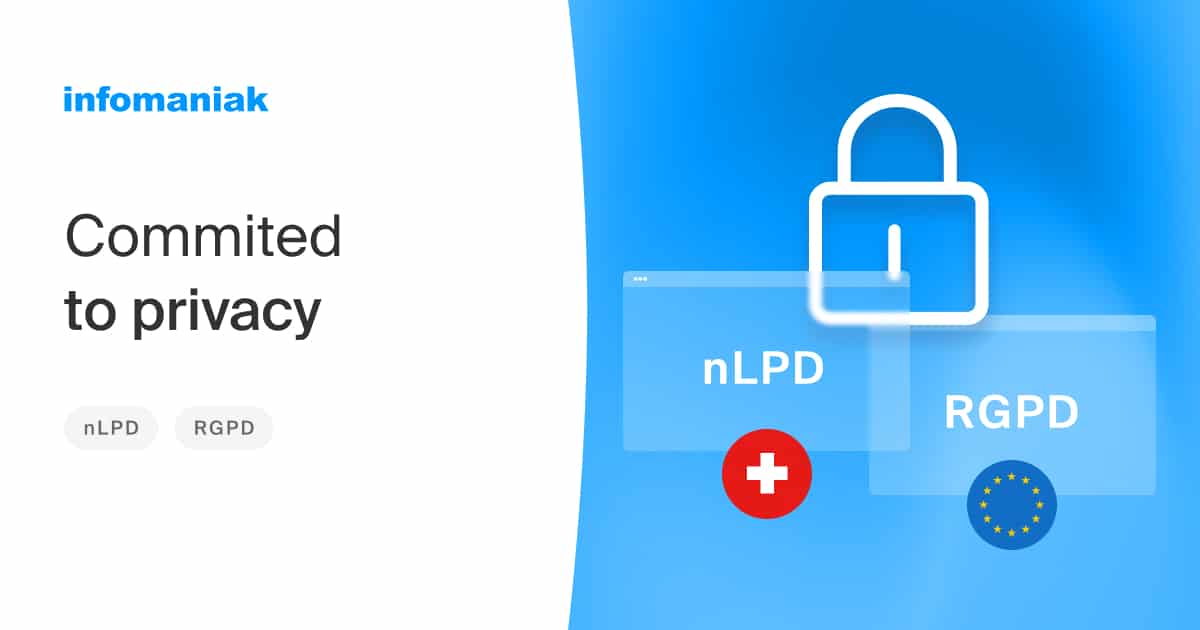Infomaniak is preparing for the arrival of artificial intelligence (AI) in its productivity tools in order to improve corporate productivity. Privacy, confidentiality and data management are at the heart of our development, as Infomaniak makes no concessions on these points. Available as an option, the AI developed by our teams will respect the strict framework of the GDPR and Swiss data protection legislation.
Work more quickly with kDrive and webmail
Our AI will be capable of finding and categorising your files and attachments so that you can quickly access your:
- bills
- receipts
- sales receipts
- CV
- delivery slips
- expense reports
- estimates
- payslips
- contracts
- identity documents
- etc.
Each document will be automatically labelled. Simply click on a label to display the desired content category. For example, you can display bills from a single supplier, sales slips from a particular month or payslips for the past year. Eventually, it will even be possible to create your own labels.
Ethical artificial intelligence
“AI will simplify company work flows. People will find the information they are looking for more quickly and spend less time sorting or categorising data. We will develop this technology in our own way, first and foremost by protecting privacy and confidentiality. We will always ensure that AI works for the users and not for other purposes.” Marc Oehler, CEO of Infomaniak
Activation is optional. You keep control.
We use so-called “weak” artificial intelligence, as with all systems currently in existence. That means that this AI is not aware of itself, does not have any sensitivity and even less so its own mind. It is not, therefore, Terminator 😉
It is an automatic learning system operated by an artificial network of neurones: deep learning. This technology give computers the ability to learn. The machine uses this to analyse data in order to take a decision in line with the situations encountered. It becomes capable, for example, of isolating shapes and faces, distinguishing typed characters, identifying signals on the stock markets, detecting fraud and even contributing to medical diagnoses. At Infomaniak, this network of neurones is managed internally and is entirely contained within our infrastructure in Switzerland.
The learning is initially developed via public data
To train itself and provide pertinent results, our AI is dependent on two things:
- the questions we ask it
- the data it uses to learn
We implement a network of neurones then give it problems to solve using public data. It involves nothing more than mathematics and statistics that we could calculate manually. AI simply enables these calculations to be repeated more quickly. This is what makes it interesting.
How exactly does it work?
The model learns to distinguish types of content using freely accessible sets of public data.
We provide it with rules and basic characteristics to enable it to train itself to find the best possible combination between them in order to distinguish holiday photos from photos of documents, photos of bills from ID photos, etc.
This is how it works:
First: the initial analysis and training phase
To detect the documents, our model observes the pixels to produce a set of rules which will represent characteristics such as:
- a rate of white pixels in excess of 80%
- the absence of people in the image
- regular margins
- a square or rectangular shape marked in the photo
- etc.
At the end of this initial training, the algorithm is capable of ignoring private photos to direct itself spontaneously towards photos likely to be documents in order to categorise them subsequently using the labels.
Second: the improvement and reinforcement phase
Determining and labelling files with the right labels is only half the job. The algorithm must then learn from the user who will necessarily change the labels so that they correspond more precisely to their files. This is the case, for example, when a user changes a large number of labels. This so-called implicit user feedback involves taking the user’s actions into account in order to improve the relevance of the algorithm so as to avoid making the same mistakes.
These steps are repeated continuously in order to feed the algorithm, enhance the learning process and increase the relevance. By adjusting the weight and threshold of the different characteristics, the AI learns to recognise certain files more accurately in order to assign the correct label. In the long term, it no longer makes any mistakes.
An individual AI, isolated from other users
No spillover possible. For personal feedback, we provide for each user being able to train, so to speak, “their own AI”. No data can be leaked to another user. Your “honeymoon” label will remain your label. The same is true for a personalised label such as “after nightclub”. No one other than you will be aware of these.
Sometimes, we need to help the machine
If a user removes 90% of the labels from their bills, for example, this is probably because our algorithm made mistakes. In complex situations, an AI specialist at Infomaniak may need to check a file or series of files manually in the event of an error. The AI may be unable to resolve the problem posed and thus find the right label. If this problem cannot be solved, if – and only if – it is a document, the machine requires help to be able to move forwards and correct its mistake.
Files with redacted personal data and metadata
Before being subjected to a manual check, all information making it possible to trace the owner must be redacted from a document.
The machine removes the link with the account from which it comes, deletes the metadata (location, time, date, device, etc.) and any words that are too specific such as first names, nicknames, etc. Once it is longer possible to identify who a file belongs to, the manual check can be started to ensure the algorithm is on the right track. In this way, we ensure that the AI always provides you with satisfactory results while respecting user privacy as far as possible.
Our commitment to ethical AI
Our vision of artificial intelligence is clear: the aim is to increase the productivity of our users without sacrificing privacy or confidentiality.
- Your data only belong to you
- Our AI technology is independent
- It is developed in-house in Switzerland
- It involves no external service provider
- It is disconnected from other users
- Everything is hosted in Switzerland in our own infrastructures
- Activation of AI is optional and deactivated by default
- The information is used solely to improve your services and in no event for marketing purposes
- Manual inspection of files is exceptional and does not make it possible to link a piece of data to its owner
- The data are irreversibly anonymised (differential privacy)
These actions are currently under development. It must nevertheless be kept in mind that these are our intentions in the field of AI and that we cannot forecast a schedule too precisely or confirm such and such a function with compete certainty. This said, we felt it was important to share our vision of artificial intelligence with you and we will continue to keep you informed of the progress made via the blog and our social networks.
Not yet at Infomaniak?
From UIKit to SwiftUI: developing an iOS mobile app with the latest Apple framework
Monday March 25th, 2024

 Français
Français Deutsch
Deutsch Italiano
Italiano Español
Español




